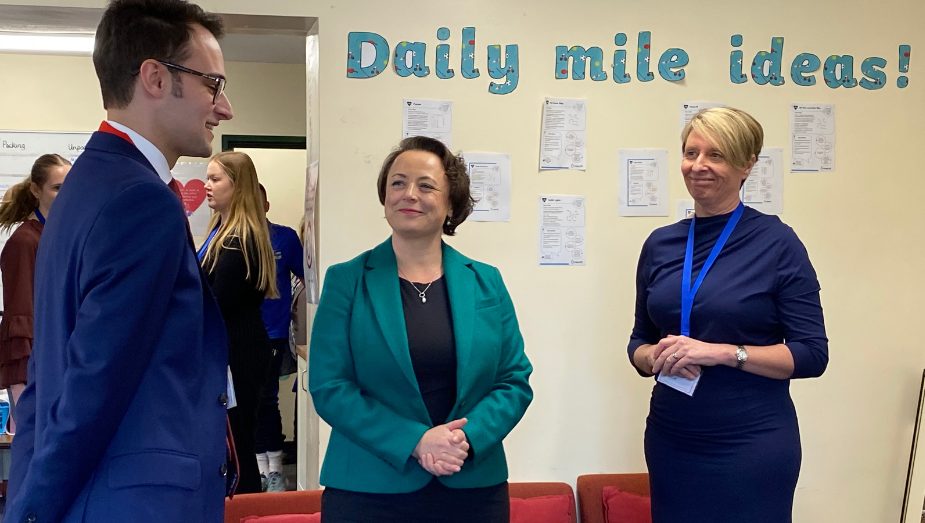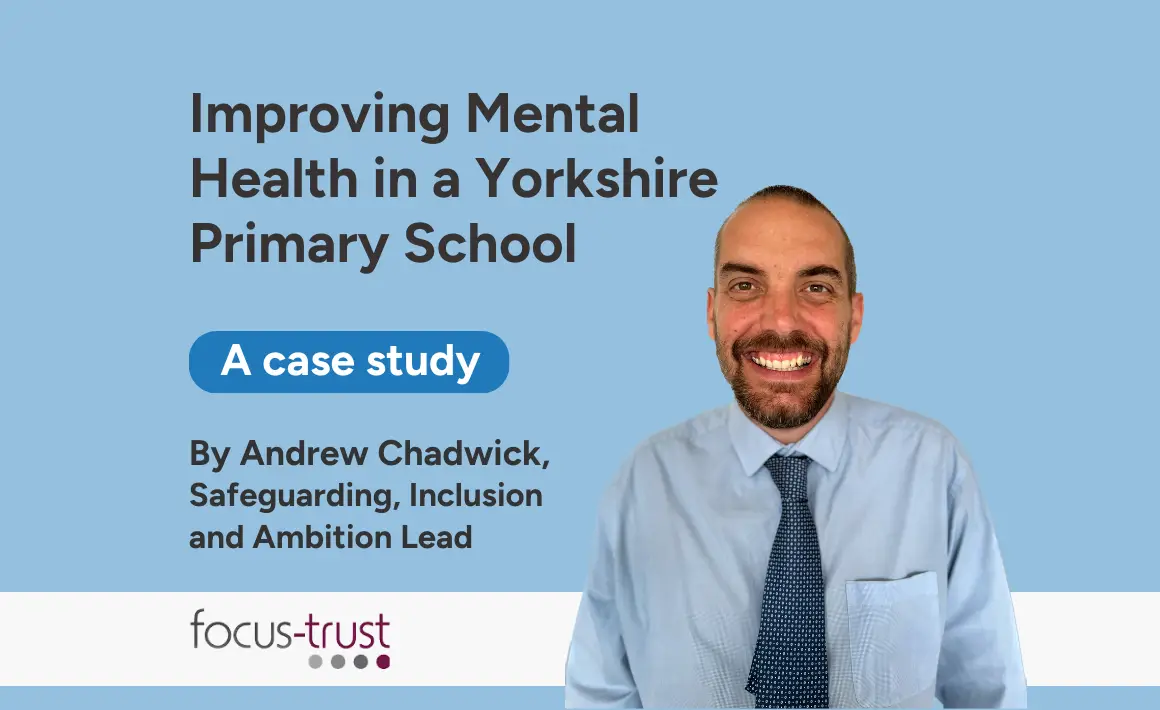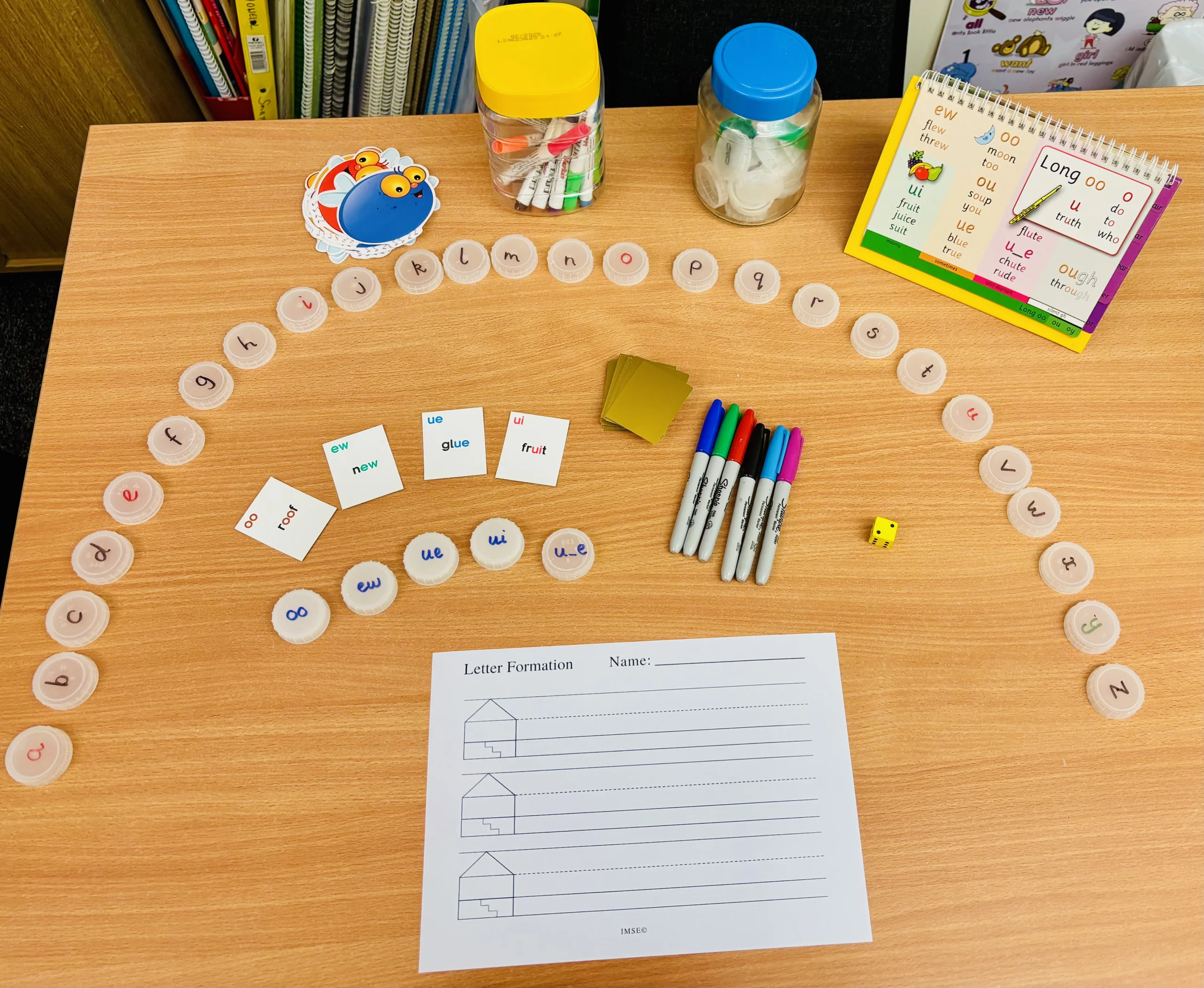Imogen Barber |
January 29, 2024
Andrew Chadwick was a senior mental health lead at a primary school in Yorkshire and is now Safeguarding, Ambition and Inclusion Lead at Focus-Trust.
Dr Joanna Wood, Andrew’s course tutor, caught up with him a year after finishing his course to see what impact the plan he launched had on mental health and wellbeing provision in his school. He also talked to us about how he had taken his learning forward into his new role across fifteen schools at the trust.
Embedding a positive ethos around mental health
Mental health has always been important but after Covid, Andrew found himself (like many), dealing with an increasing number of problems surfacing not only from pupils but also parents and staff. He was keen to avoid a piecemeal approach, where mental health training was only for the few.
“If you want something to embed properly it needs to be a whole-school approach rather than just an add-on.” Andrew explains. “Having a standalone person trained to tackle or troubleshoot mental health doesn’t feel that inclusive. You need a strategy for parents, children and staff; everything that you do as a school community – and someone senior to lead it.”
Hear from Andrew below on why the need for a whole-school approach led him to take the Advanced Senior Mental Health Training course and his tips for embedding a positive ethos on mental health.
Developing an action plan and a tailored trauma programme
In Andrew’s school, there were pupils from diverse socioeconomic backgrounds, including individuals whose behaviour was hard to manage, linked to childhood trauma.
Whilst on the advanced course, all delegates create and get detailed feedback on an action plan. Andrew’s plan led him to implement the following tactics;
- a weekly play therapist sessions to tackle trauma
- a drop-in mums-only wellbeing group
- a parent outreach and communication programme via newsletters
- specific staff training for those responsible for pupils who had experienced trauma
- all-staff training on social-emotional needs and mental health
- a cross-staff working party that reported back to the SMHL
- an adapted version of the Zones of Regulation
- wellbeing resources for both staff and parents on the school website
In the below video, he describes his approach to trauma training and the incredible impact it had on one particular student when parents, staff, and senior leaders were able to work together around a unified strategy.
Helping parents with their own mental health – the “penny-drop” moment
“The impact that a parent’s mental health can have on a pupil is massive. The course was really good for that – it shaped my thinking” explains Andrew. “It was half way through doing the reflective journal that I ended up doing a complete 360 to refocus on parental mental health. It was a penny-drop moment.”
One of the other things that was top of mind for Andrew was that some children are very good at masking. “Sometimes issues can be dismissed by schools, especially if the behaviour isn’t immediately obvious or disruptive” he explained. “We took a different view and thought; well if it’s an issue at home then it’s still an issue in school and we should try to address it. As soon as we proactively communicated with parents and they could see we were trying they were a lot more open with us. Building relationships and trust then allowed us to have the more challenging conversations.”
“Rightly or wrongly there’s not as much provision out there as there used to be – we could sit and complain about this or we could do something about it. That’s where the senior mental health role and the training comes in.”
The impact of a whole-school approach to mental health
Adopting a system-wide approach allowed Andrew to create an open culture around mental health. Establishing an all-staff working party helped facilitate this, and he was pleased to see lunchtime cover supervisors and support staff also keen to attend meetings.
Did this system-wide approach ultimately have an impact on things like attendance and behaviour?
Andrew believes so. “I think it did have a positive impact. People were having conversations about mental health more openly and with confidence,” he reflects. “If a pupil or parent was saying they were a bit anxious about coming to school, staff weren’t just waiting on me saying, let’s try this or that. Instead, they were able to say; don’t worry we can help, so when that pupil arrives in the morning we can try one of our strategies to make it easier for them to come in.”
Learning as you go and bringing everyone on the journey
Some of the initiatives he implemented were met with initial reluctance and uncertainty from certain staff which had to be worked through, while other strategies needed to be adapted in order to see success.
For example, the additional attention pupils received after putting themselves in an angry zone during daily check-ins inadvertently incentivised some children to deliberately mislabel their emotions. Although understandable, this needed to be discouraged by making initial check-ins much lighter-touch.
Reflecting on the benefits of the Senior Mental Health Leadership Advanced course
For Andrew, the course helped him evaluate his school’s current strengths and weaknesses as well as where they should go next, including more strategic use of the data.
“The course is your day-to-day job and that’s one of the things I really liked. It just prompted me to probe what I was doing and be a lot more strategic.” Andrew reflects.
“As an example, we didn’t just launch Zones of Regulation, we actually looked at what we wanted to get out of launching it. We developed our own school version of it with our staff and they were fully on board and had a say in it which made rolling it out much easier. We were also more strategic around how we used the data from our Key Stage 2 mental health checks and targeted spot-checks for vulnerable individuals.”
Read more: Andrew’s review of the senior mental health advanced course and its benefits
Carrying learning forward working across the trust
Andrew is passing on his knowledge throughout the trust, especially when it comes to teaching staff the power of gentle, casual check-ins, modelling their own feelings and self-regulation for the class to observe and helping pupils achieve this for themselves.
Putting in place quality supervision as well as focusing on staff well-being are his two other major priorities right now. “We want our teachers to know that if they are feeling angry or overwhelmed they can come and knock on the door of a leader and that leader’s going to stop everything and talk to them.”
A new initiative: Mental health cookery classes
Andrew also took the time to share with us some ambitious new plans he has to continue to engage parents. Over nine weeks, parents at one particular school will be invited to cookery classes with a really important, but informal message about mental health delivered by the tutor each week. Incentivising attendance and breaking down barriers using a naturally social activity such as cooking and sharing food will, he hopes, help reduce stigma and also get people talking.
Read more
Explore Real Group’s advanced or certificate-level senior mental health training courses.
Deepen your knowledge of the whole school approach in our blog: Getting to Grips with the Senior Mental Health Lead Role
Read Andrew’s review of our Senior Mental Health Lead advanced course






What do you think?